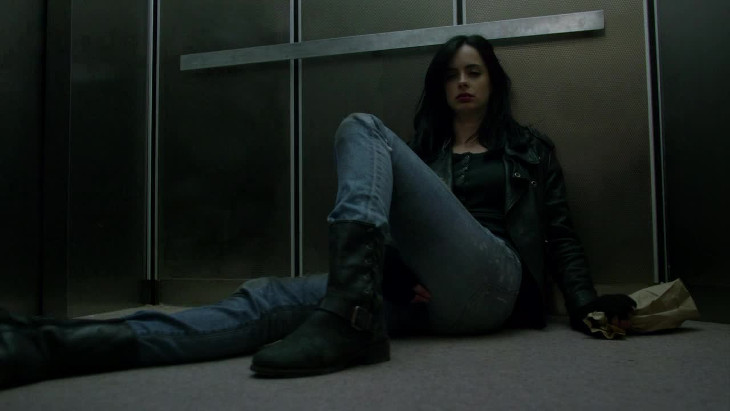
Jessica Jones is an odd outlier from both a production and character standpoint. When comparing it to its Netflix sibling and predecessor Daredevil, it comes off as less self-contained, but overall has better pacing. The end result is a series that has roughly the same quality, but possesses a completely different list of strengths and weaknesses. Of the four Marvel characters receiving their own Netflix series, Jessica is easily the newest creation, having originated in the 2001 series Alias which was written by Brian Michael Bendis. It was due to said series that Jessica Jones became my personal favorite Marvel character, and it was also because of that series that I went into Jessica Jones with a blend of both excitement and trepidation. Jessica Jones was first established as a well connected character that had essentially been relegated to the background, but who was relatively well know for her stint as a hero. However, because heroes are still a somewhat rare occurrence in the extended MCU, this seemed like premise that would prove at least partially infeasible. And, to some extent, it partially was, though what we end up with instead is still quite good.
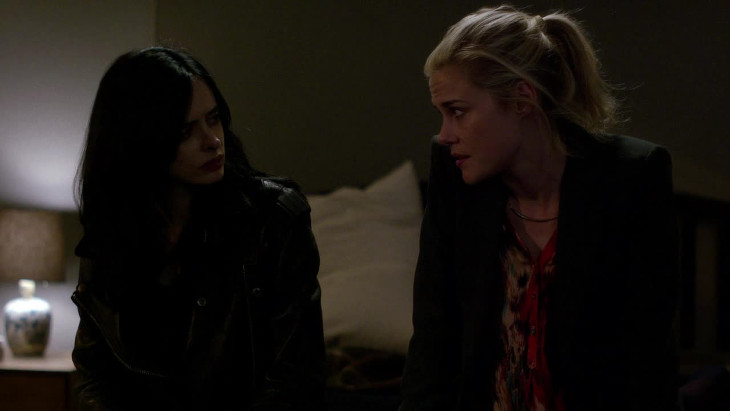
The basic idea behind the character is that, after a brief attempt at heroism goes terribly wrong, superhuman Jessica Jones gives up the idea of being a hero, and instead becomes a private investigator. Both the comic and the Netflix series rely on this as the basic conceit, though some details are shifted to avoid complications. Fans of the comic who may have been hoping for cameos from Scott Lang or the Avengers should be prepared for some disappointment. Though, on the whole, the series feels a bit more connected to the Marvel universe than Daredevil due to appearances by characters such as Trish “Patsy” Walker, Claire Temple, a gender-swapped version of Jeryn Hogarth, and, of course, Luke Cage. This actually proves to be slightly problematic as the show has a tendency to introduce characters or ideas, but leaves them hanging without a proper sense of resolution, presumably so that they can be used in later seasons or in different shows. But even with this problem, the majority of the characters are spot on. Despite her excellent performance on Breaking Bad, I was initially skeptical when I heard Krysten Ritter had been cast in the lead role, because, to be perfectly honest, I wondered if she might be too pretty to play the dressed down and worn down Jessica. However, those reservations went out the window almost immediately. Ritter embodies the role perfectly, pulling off everything from the snide comebacks to the cheesy noir style voice overs with complete confidence. She carries the show through some of its weaker patches so well that she makes it look effortless, while at the same time still making Jessica look like she has the weight of the world on her shoulders.
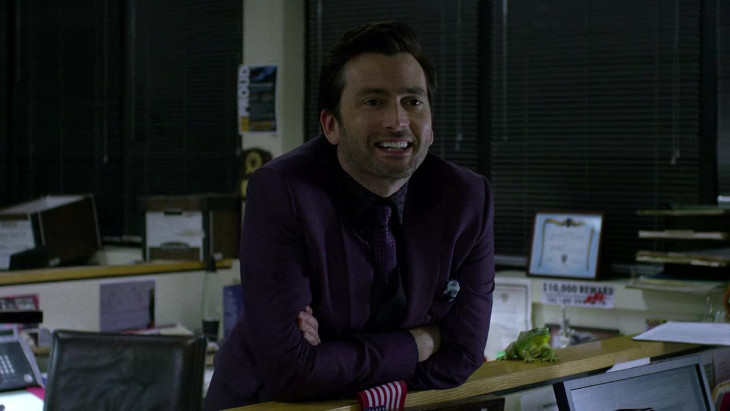
The series antagonist Kilgrave, played masterfully by David Tennant (Doctor Who, Broadchurch), carries on what appears to be a growing trend of Marvel TV villains being more interesting than their movie counterparts (See: Kingpin and Mr. Hyde). His powers and character work in a similar fashion to his character in the comics, The Purple Man, even if his backstory is heavily altered. Whereas the Kingpin was a scheming mastermind who sought to influence people on a grand scale, Kilgrave is essentially a petulant child who can influence people to give him whatever he wants. There are numerous scenes of him forcing people to kill or try to kill themselves or others, and those moments retain a chilling quality to them all throughout the season. However, I would argue that Jessica Jones does start overindulging in its use of Kilgrave. He is most effective in the beginning when he is a rarely seen presence who influences and tortures people from the shadows. He never loses all of that sinister edge, but it is diminished some as we see more of him and learn about his past.
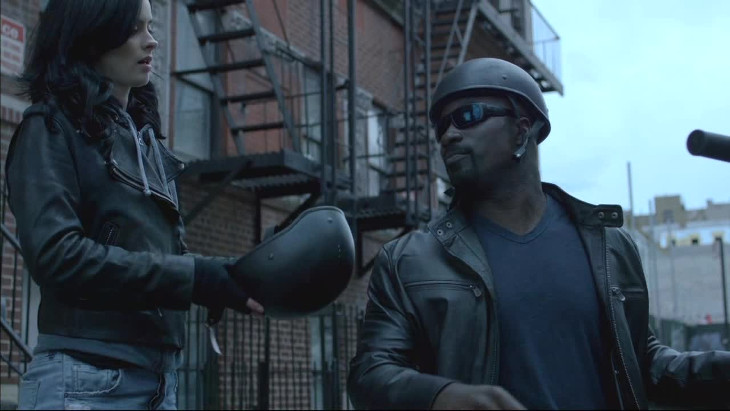
The remainder of the main cast was, for the most part, quite good. Michael Colter makes for a very good Luke Cage, and I’m eager to see him in his own series. Likewise, Rachael Taylor’s Trish also proves to be a notably compelling character who serves as Jessica’s friend and conscience. Her interest, or rather obsession, with heroism raises the question of whether we may eventually get to see a live-action version of Hellcat, but it also plays to deeply seated insecurities inherent in the character. The only point at which the characters fall short is that some of the minor characters come off as being unnecessarily annoying like the siblings that live above Jessica, an insipid couple who are out to murder people with powers, or various proclaimed victims of Kilgrave that come forth to try and justify their questionable actions. These types of characters aren’t a significant problem, but it is usually in scenes with them that the dialogue drops slightly, so while it may not be a major issue, it is still worth making note of.
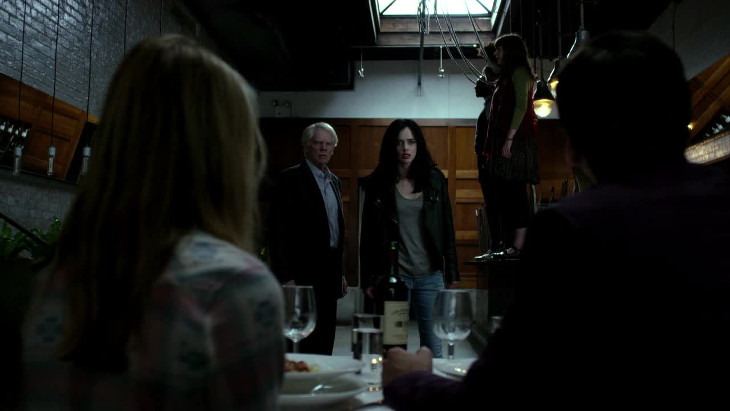
A more significant issue for Jessica Jones is how it goes about filling up thirteen episodes of runtime. Whereas Daredevil slowed to a crawl in its final act, Jessica Jones treads water by having Kilgrave constantly escape from every trap set for him. In theory, I prefer this approach, but he escapes a few too many times for it to feel natural, and some of those escapes are due not to his brilliance, but rather to the idiocy of others involved. Otherwise, the plot maintains a tense game of cat and mouse that pays off in spectacular and horrifying ways as it unfolds. The show bravely refuses to shirk away from the dark subject matter that characterized the source material. Topics like rape, abuse, and long term trauma are are wielded with both the weight and care that they deserve. It can be difficult to utilize those subjects without seeming exploitative or crass, but Jessica Jones deftly avoids those pitfalls, and instead uses these subjects to further highlight the horror of Kilgrave’s actions by making the viewer intimately familiar with their aftermath. His tendency to shift the blame onto his victims, claiming that they didn’t do anything they didn’t want to, serves to further exhibit his complete lack of empathy or humanity.
Before I wrap up, a few Notes and Nitpicks:
- I quite like the opening sequence to Jessica Jones. It’s visuals are quite nice with bleeding watercolors constructing a neon-noir (Isn’t that technically a contradiction?) landscape, and the music has a very nice build to it.
- Daredevil’s absence from the show is actually a little distracting. While, I can understand Jessica not running into Matt Murdock on the street, at no point does anyone mention Daredevil or the Devil of Hell’s Kitchen or the Kingpin. It isn’t until the tail end of the season that anyone made any reference to Daredevil at all and even then it wasn’t by name. It isn’t like there wouldn’t be precedent for him interacting with Jessica in a professional sense. In the comics he actually provided legal representation for her, and she did work for him, though that admittedly seems to be Hogarth’s role here.
- That brings me to Carrie Anne-Moss’s (The Matrix, Memento) role as Jeri Hogarth, a manipulative lawyer that Jessica does work for. I’m not entirely sure what to think of the character yet, since I think the show presents what is the first part of a redemptive arc for her. The acting is great, though, and if the other Marvel Netflix shows plan on continuing this redemptive arc, then I am eager to see more of her.
- Apparently, Eka Darville, who does an excellent job playing Malcolm, Jessica’s neighbor, is a former Red Ranger. Birdy was quite amused. No relation to Arthur Darvill, though. After all, he’s property of DC.

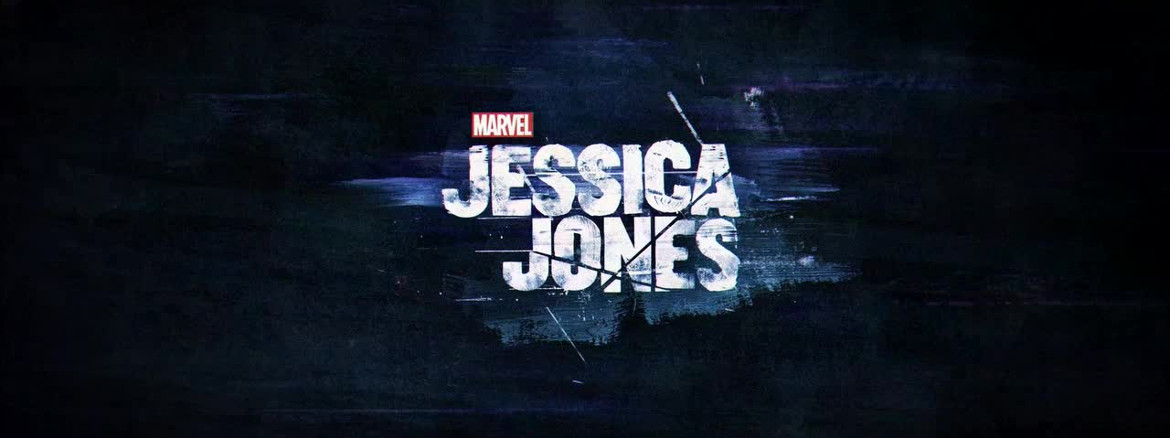
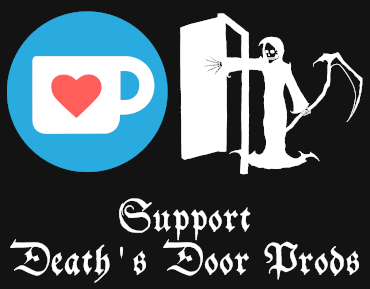

Add comment